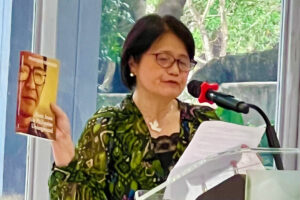at the UP Vargas Museum on Feb. 8.
If there is a chapter in this book of 345 pages that you should read, let it be the first chapter, “Turning Left.”
In 1999, Dodong writes, the University of the Philippines (UP) Board of Regents interviewed him for the UP presidency position, and I quote:
“They asked me point-blank if it was true that I was a Communist. I said, ‘Yes, with a small letter ‘c,’ meaning I remain a Marxist, but I do not belong to the Communist Party of the Philippines or the Partido Komunista ng Pilipinas. I had severed my ties with the PKP. If elected president, I will take no orders from any external group. The university will be my singular concern.”
This statement speaks volumes about an unabashed, unapologetic communist, with a “small c,” who was able to occupy a high national office, the only one to ever do so at that time in this benighted land of McCarthy witch-hunting, while keeping his ideals and integrity intact, pioneering programs to foster a UP renaissance as he continued his own organizational endeavors.
Dodong Nemenzo’s book on his “quest for relevance,” which led him to embrace socialism, is a fascinating read of 13 chapters, each an essay or lecture, split into three main sections — histories, political conjunctures and perspectives. But the book is greater than the sum of its parts as the author himself transcended the limits of the academic world and any single organization.
I was one of Dodong’s students in the general education courses on social and political thought during martial law. And fortunate to have done so as he made us read the classic philosophers and political thinkers from Plato to Machiavelli to Marx, and of course, Mao, whom he less revered and sharply critiqued. Mao Zedong thought was also the greatest divide which, as he admitted, caused him to diverge paths from his best friend Joe, or Joma as Jose Maria Sison is more widely known.
I once thought that Dodong had recruited Joma into the Communist Party. I was surprised to learn from both that it was the other way around. As Dodong writes, in February 1965, Joma extended an invitation to Dodong from the PKP, which elevated him afterward to the Provisional Central Committee. Also, it was Joma’s wife, Julie, who bridged Dodong and Princess with William Pomeroy and Celia Mariano, PKP officials who went into political exile in England during the time that Dodong and Princess studied there.
Let me add: In March 2024, nine months before he died, Dodong told his close comrade, Ed Tadem, that he regretted not joining Joma in the formation of the CPP. (By the way, Feb. 8, 2025, the date of the launching of Notes from the Philippine Underground, would have been Joma’s 86th birthday, and Feb. 9 would have been Dodong’s 90th.)
Indeed, this anthology is more than just a collection of essays on political history. To relate something I read on Cervantes’ Don Quixote, it isn’t just a book. It’s a journey into the heart of what it means to dream, to stand up for what you believe in, no matter the cost, and to see the world not as it is, but what it could be.
Yet Dodong was not simply tilting at windmills or solely fixated on his real-life Princess. Despite the ordeal of political imprisonment during martial law and trumped-up rebellion charges in 2006, he remained forever a teacher and a unifier as he mentored diverse groups, from idealistic students to disillusioned activists to disgruntled officers, and rose above differences to join national democratic forces in a broad united front against the fascist dictatorship and to work with his old friend Joma during peace negotiations.
So, here’s to the dreamers, the activists, the revolutionaries who dare to think differently and never give up to make the world a better place. Before I end, together with my husband Vic Ladlad, I want to say a heartfelt thank you to Dodong and Princess for their unwavering support for political prisoners.
Fides Lim is a writer, editor and spokesperson of Kapatid–Families of Political Prisoners, and a fellow of Action for Economic Reforms.
